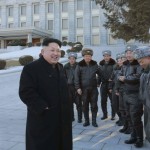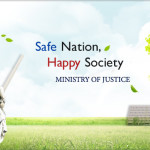- DETERRENCE: The security risks of China’s nuclear reprocessing facilities
- DPRK: North Korea says it sees no need to negotiate with ‘gangster’ U.S.
- GOVERNANCE AND CIVIL SOCIETY: Gov’t seeks to disband anti-state activist groups
- CLIMATE CHANGE ADAPTATION: Public health adaptation to climate change in Canadian jurisdictions
- CLIMATE CHANGE AND SECURITY: As Davos meeting closes, climate ‘warning shots’ from Africa and Pacific
 DETERRENCE: The security risks of China’s nuclear reprocessing facilities, Hui Zhang, Nuclear Security Matters Commentary, Belfer Center, Harvard University (8 October, 2014)
DETERRENCE: The security risks of China’s nuclear reprocessing facilities, Hui Zhang, Nuclear Security Matters Commentary, Belfer Center, Harvard University (8 October, 2014)
Zhang writes that China must address the inherent security risks of expanding spent fuel reprocessing including facility protection, material accounting, and transportation security. Liu summarizes Zheng’s 2005 study of terrorist attack on spent fuel in China.
- Spent nuclear fuel management in China, Xuegang Liu, NAPSNet Special Reports, (05 August, 2014)
- Consequence assessment of attacking nuclear spent fuel pool by terrorist, Q. Y. Zheng, et al. Radiation Protection, (in Chinese), 25:(1 January 2005), pp. 45-50 [PDF, 0.2MB]
 DPRK: North Korea says it sees no need to negotiate with ‘gangster’ U.S. Reuters. (3 February 2015)
DPRK: North Korea says it sees no need to negotiate with ‘gangster’ U.S. Reuters. (3 February 2015)
For various reasons, none of the Six Parties have found a mutually acceptable mix of actions to resume discussions. Russia is considering military exercises with North Korea – a move sure to complicate what is already a remote chance of re-starting Six Party Talks. These proposed military drills are also likely meant to signal a willingness to move away from both China and the United States.
- U.S. and North Korea have been secretly discussing having ‘talks about talks’. Anna Fifield, The Washington Post (2 February 2015)
- UN official: NKorean human rights, cult of Kim can’t coexist. Erik Talmadge, Associated Press. (2 February 2015)
- Russia has announced plans for joint military drills with North Korea. Jeremy Bender, Business Insider (3 February 2015)
 GOVERNANCE AND CIVIL SOCIETY: Gov’t seeks to disband anti-state activist groups, Yonhap News (21 January 2015)
GOVERNANCE AND CIVIL SOCIETY: Gov’t seeks to disband anti-state activist groups, Yonhap News (21 January 2015)
The ROK Ministry of Justice has unveiled plans to strengthen its ability to disband “anti-state” groups, particularly any who are seen to be praising the DPRK, and will also work with the Education Ministry to revise textbooks to allow students to better understand the Constitution and create a more law-abiding society. Some activist groups fear this will lead to limitations on freedoms of speech, among others.
- Seoul seeks law to disband pro-N.K. groups, Kim Yon-se, Korea Herald (21 January 2015)
- Korea’s Ministry of Justice vows to build law-abiding, transparent society, Park Ji-won, Arirang News (22 January 2015)
 CLIMATE CHANGE ADAPTATION: Public health adaptation to climate change in canadian jurisdictions, Int. J. Environ. Res. Public Health, Stephanie E. Austin et al., vol. 12, No. 1, pp. 623-651 (2015) [PDF]
CLIMATE CHANGE ADAPTATION: Public health adaptation to climate change in canadian jurisdictions, Int. J. Environ. Res. Public Health, Stephanie E. Austin et al., vol. 12, No. 1, pp. 623-651 (2015) [PDF]
Despite the importance of adaptation in a public health context, to our knowledge there has not been a systematic examination of the current state of health adaptation across Canada. Health Canada and Natural Resources Canada, departments of the federal government, have conducted comprehensive vulnerability assessments which outline some examples of adaptation. However, these assessments were not designed to characterize and compare adaptations at different jurisdictions, across regions, and over time.
- Integrating climate change adaptation into public health practice: Using adaptive management to increase adaptive capacity and build resilience, Jeremy J. Hess, Julia Z. McDowell and George Luber, Environ Health Perspect, vol. 120, pp. 171-179 (2012)
- Canada in a changing climate: sector perspectives on impacts and adaptation, Natural Resources Canada (2014)
 CLIMATE CHANGE AND SECURITY: As Davos meeting closes, climate ‘warning shots’ from Africa and Pacific, Maarten van Aalst, Red Cross/Red Crescent Climate Centre (29 January 2015)
CLIMATE CHANGE AND SECURITY: As Davos meeting closes, climate ‘warning shots’ from Africa and Pacific, Maarten van Aalst, Red Cross/Red Crescent Climate Centre (29 January 2015)
Davos global actors talked “complexity, fragility and uncertainty” this year, with “extreme weather events” as the second most likely Global Risk in 2015. Clued into complexity by their task, Red Cross/Red Crescent aims “to quickly provide indications of the role of climate change in current events – within days rather than months or years after the event.” But climate and society early warning systems require messages with conflict consequences to be heard – as did not happen in Syria.
- Global Risks 2015 10th Edition, World Economic Forum (January 2015) [PDF]
- International Federation of Red Cross and Red Crescent Societies: Forecasts in Context, International Center for Climate and Society (IRI)
- Climate, scarcity and conflict, Shiloh Fetzek and Jeffrey Mazo, Survival: Global Politics and Strategy, 56:5, 143-170 (2014)
The Nautilus Peace and Security Weekly Report presents articles and full length reports each week in six categories: Austral security, nuclear deterrence, energy security, climate change and security, the DPRK, climate change adaptation and governance and civil society. Our team of contributors carefully select items that highlight the links between these themes and the three regions in which our offices are found — North America, Northeast Asia, and the Austral-Asia region.
Subscribe to NAPSNet to receive free weekly email reports.
- Editor: Rebecca Pollack
Contributors:
- Deterrence: Peter Hayes
- DPRK: Roger Cavazos
- Governance and Civil Society: Dyana Mardon
- Climate Change Adaptation: Saleem Janjua
- Climate Change and Security: Richard Tanter

